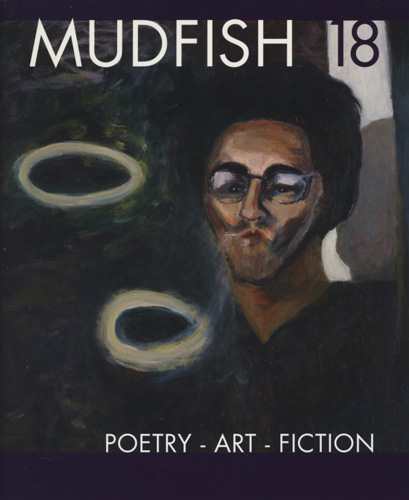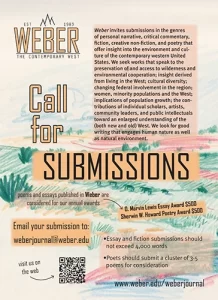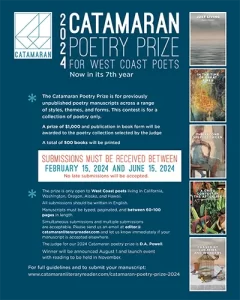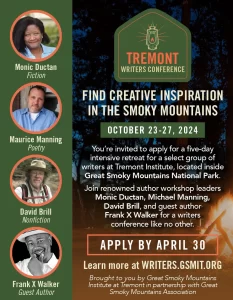Mudfish – 2015
This issue of Mudfish opens with the winner of the 11th Mudfish Poetry Prize Chosen by Charles Simic: “Waking Alone on Sunday Morning” by Elisabeth Murawski. This issue of Mudfish opens with the winner of the 11th Mudfish Poetry Prize Chosen by Charles Simic: “Waking Alone on Sunday Morning” by Elisabeth Murawski. The short poem features line after line of imbedded and internal rhyme, as in:
Each year, hearing
for the first time
the double coo that gavethe bird its name, Wystan Hugh
would note the momentin his diary, calling it
holy.
Following the winner are the first and second honorable mentions, featuring a villanelle by Kyoko Uchida, and a poem about marriage and a dog by Cornelia Hoogland, which, oddly enough, is one of two dog poems featured in this issue.
In the poem, “Things I’ve Left Behind,” Martin Ott, keeps his reader enthralled until the end with a fast tempo, rhythmic poem that flows off the tongue and down the page: “so much pain and glory over days / that broke skin, hearts and bridges. [ . . . ] still half traveled, I keep fused bones, shadow / [ . . . ] strangers can see, these steps, this passage of me.” The poem begins with the things left behind, but ends with the things still kept, implying that even the things we leave behind will always stay with us.
“Barcelona,” by Joseph Voth, is a fascinating poem printed in two columns which appear to be in conversation with one another, almost as if the second column addresses the first. The first column is more narrative, “with your tongue / in the tumbler of a latch [ . . . ] unlocking the day”; the second column becomes more lyric, allowing the reader to slip into the poem and inhabit space, “we are each a poison the / other has taken for too long.”
The poem “Love Letter 23” by Esvie Coemish features interesting language that kept me reading to the end:
Tell me the core of the night is a lark’s
gizzard cramping the gelatinous
messiah’s bones back to stardust,
that it’s you speaking to me like a tape recorder’s
housefly hum.
The poems narration is excitingly strange and refreshingly different, especially given its overused title.
Perhaps my favorite feature of Robert Levy’s poem “Shelling” is how just how much work the title is doing. While I’m usually not a fan of titles plucked from their poems, I can make an exception for this one since it encompasses so many ideas from the poem, from the shucking of the octopus from its shell, as well as the shucking of childhood innocence, to the simple act of looking for shells on the beach. Besides the awesome title work, the poem features some pretty rad diction such as,
Over calcium wreckage,
with rakes and buckets, we tentatively amass
the moonlit dead, a mummified palette
of abandoned mollusk homes
In prose, Michael Lee Phillips’s “Paella” centers on the experience of a young worker and his experience loading boxcars one summer break during college where he learned “the craft of silence,” as in, not speaking when unnecessary. The silence he learned within, however, clashed with the noise that surrounded the characters: “outside our cramped lunch room the old debates continued—steam venting its rage at the way metal tried to hold it back, gears creaming for their daily oil, boxcars gripping and ungripping their massive iron fists, their handshakes crashing down the line,” finding peace in a chaotic world.
Jill Hoffman’s “Rival Myths” documents the moment the main character realizes her longtime friend has Alzheimer’s. Hoffman touches on heavy subjects where “the past was split like an ovum into rival myths” with each allegory contesting the other and only one reliable witness to the past, the narrator: “It was like the magic slate I had been given as a child. You wrote on it and then lifted the clinging transparent sheet. All her memories were erased. She was there, large as life, in Santa Rosa, and she was gone.” Concluding with the main character losing and forgetting a pin which she had search frantically for compels the reader to question even the narrator’s own reliability as a witness. In closing the issue, this leaves the reader questioning the dependability of everything they had read from the beginning.
Featuring a broad range of poetry and an even broader range of art, this issue of Mudfish is definitely an interesting read!
[www.mudfish.org]





